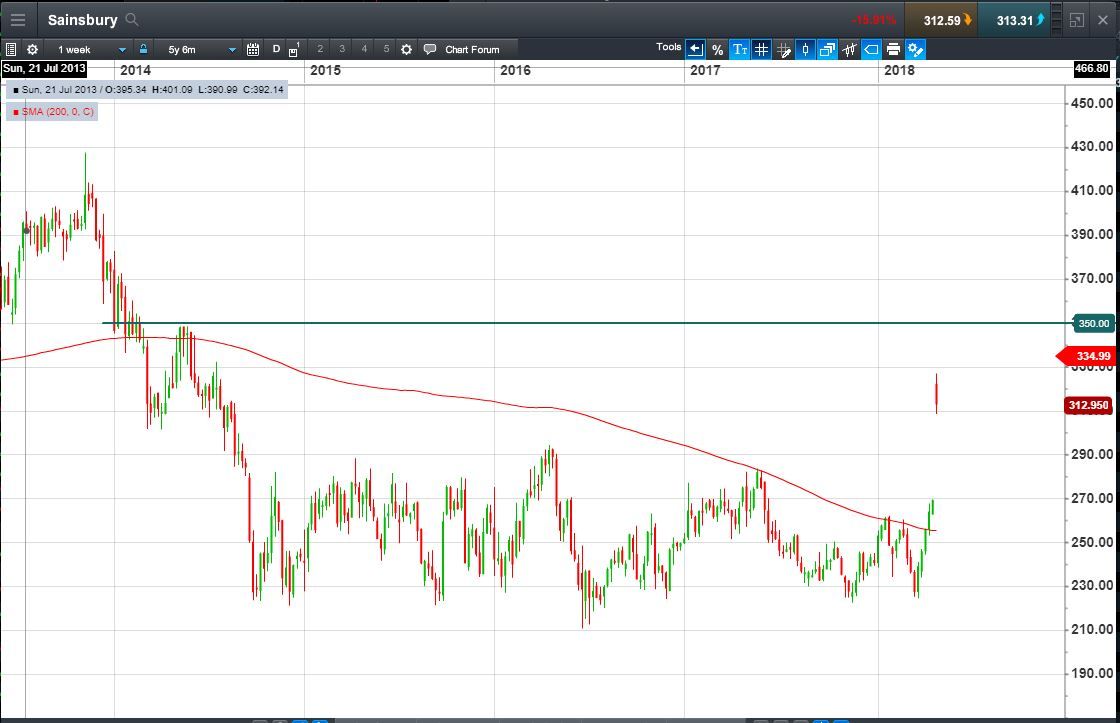Sainsbury’s shares have jumped this morning after the company stated it is planning on merging with Asda, which is owned by Walmart.
The proposed deal would be worth £7.3 billion, and Sainsbury’s would pay £2.98 billion in cash, and £4.3 billion in stock for Asda – which would end up with a 42% stake in the combined entity. Asda will not hold more than 29.9% to the total voting rights.
Sainsbury’s and Asda are the second and third largest supermarkets in the UK, and should the deal go ahead the new company would knock Tesco off the top spot. Morrisons who are already languishing behind in fourth place would become a distant third in the market share ranking.
Sainsbury’s stated there is a ‘very compelling case’ for the merger, and they believe the move would produce £500 million worth of synergies. Subject to regulatory approval, the new entity would have 2800 stores and a workforce of 330,000. The UK supermarket sector has been shaken up by deep discounters such as Aldi and Lidl, and Amazon Prime also pose a threat to the traditional players too. Competition in the sector is heating up and this proposed merger is further proof the stalwarts of the high street are keen to defend their territory.
The retailer was planning on revealing its full-year figures on Wednesday, but instead decided to announce the figures early along with the merger plans. Full-year underlying pre-tax profits rose by 1.4% to £589 million. In February, and the CEO, Mike Coupe, stated underlying profit would be ‘moderately ahead’ of the £559 million consensus, and that figure was easily exceeded. Net debt fell by 7.8% and the final dividend was increased by 8%, and this is also adding to investor confidence.
Sainsbury’s had a record Christmas period thanks to strong online sales and a solid performance from Argos. In the 15 weeks until 6 January, sales excluding fuel, rosy by 1.2% compared with the same period last year. The like-for-like sales figures, which strips out new store, saw revenue increase by 1.1%. These are respectable growth levels in a difficult retail environment.
In a sign that consumer sentiment is picking up, Sainsbury’s stated their ‘Taste the Difference’ brand saw increased demand compared with the previous Christmas. At the end of last year, the British consumer was under pressure from rising inflation and mediocre wage growth. Now that the cost of living is cooling, it might pave the way for increased retail spending.
The company is embracing technology as online sales accounted for 20% of all sales during the last quarter. The integration of Argos is going well too as there was impressive growth in Agros Fast Track delivery and collection, which saw an increase of 39% and 25% respectively. Argos opened 52 new stores in Sainsbury’s supermarkets, which brings the total to 164. This highlights the accelerated nature of the integration.
The rise of Lidl and Aldi forced the ‘big four’ supermarkets (Tesco, Sainsbury’s, Asda and Morrison’s) to refocus their businesses, and Sainsbury’s pledged to open more convenience stores. In the last quarter, convenience sales jumped by 7.3%. Consumers habits are changing are Sainsbury’s have proved that are successfully adapting to the new environment.
According to Kantar, Sainsbury’s saw 1.1% saw growth in the 12 weeks until 25 February – it was the lowest rate of the big four. Tesco and Morrisons were in first place with 2.7%, while Asda saw 2.3% growth. Sainsbury’s offered fewer sales promotions that is the likely reason behind subpar growth. 34.5% of Sainsbury’s sale on promotion, and that compares with 41.9% for the other major supermarkets. This underlines how savvy the British consumer is.
The share price gapped higher this morning, and if the bullish move continues it could target the 350p region. Support may come into play at 255p (200-week moving average).

CMC Markets is an execution-only service provider. The material (whether or not it states any opinions) is for general information purposes only, and does not take into account your personal circumstances or objectives. Nothing in this material is (or should be considered to be) financial, investment or other advice on which reliance should be placed. No opinion given in the material constitutes a recommendation by CMC Markets or the author that any particular investment, security, transaction or investment strategy is suitable for any specific person.






